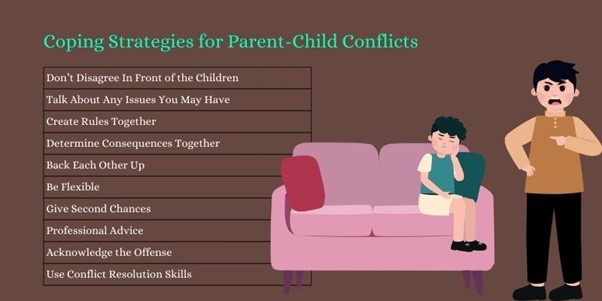How to Deal with Parenting Conflicts
Conflicts happen in every family—it’s normal. But when arguments go unresolved or become too frequent, they can damage relationships and cause lasting emotional stress.
That’s why learning effective family conflict resolution strategies is so important.
Knowing how to calmly handle disagreements can bring your family closer and create a more peaceful home.
According to the American Psychological Association, nearly 70% of Americans say that family stress has a significant impact on their mental health.
This shows how important it is to learn healthy ways to talk things through and solve problems together.
Whether it’s a misunderstanding between siblings, a clash between parents and teens, or stress over responsibilities, having a plan for resolving conflict can prevent tension from turning into long-term resentment.
In this blog, we’ll explore simple, practical strategies that can help your family communicate better, understand each other’s needs, and build stronger bonds—even during tough times.
10 Tips to Resolve Family Conflicts (Coping Strategies for Parent-Child Conflicts)

Every family faces disagreements, especially between parents and children. But how you handle those conflicts makes all the difference. Healthy conflict resolution not only improves communication but also builds trust, respect, and emotional safety within the home.
These ten family conflict resolution strategies offer practical ways to cope with challenges, reduce tension, and create a more understanding and cooperative environment between parents and kids.
1. Don’t Disagree In Front of the Children
When parents argue or contradict each other in front of their children, it creates confusion and insecurity. Kids may feel caught in the middle or use disagreements to manipulate situations to their advantage.
It’s best to present a united front and discuss differences privately. This shows children that their caregivers are working as a team, creating a sense of stability and reinforcing healthy boundaries.
2. Talk About Any Issues You May Have

Bottling up feelings leads to resentment. Open, honest conversations about frustrations or misunderstandings help clear the air and prevent minor issues from growing.
Encourage calm, respectful dialogue where everyone feels safe to share their side. Listening without interrupting shows respect and keeps emotions from escalating into conflict.
3. Create Rules Together
When parents and children work together to set household rules, kids feel more involved and respected. This builds cooperation and makes them more likely to follow the rules.
Sit down as a family and agree on expectations—such as chores, screen time, or curfews—so that rules feel fair and clearly understood by all.
4. Determine Consequences Together
Just as with rules, involving kids in deciding reasonable consequences teaches accountability. It also reduces the chance of power struggles when rules are broken.
Consequences should be clear, consistent, and age-appropriate. When kids help define them, they’re more likely to accept the outcome and learn from it.
5. Back Each Other Up

Consistency between caregivers is key. If one parent enforces a rule and the other undermines it, it creates confusion and division.
Support each other’s decisions in front of the child—even if you disagree privately. Discuss any differences out of earshot and present a united solution afterward.
6. Be Flexible
Every child and situation is different. Sticking rigidly to rules or expectations can create unnecessary conflict.
Flexibility shows that you’re open to growth and understanding. Whether it’s adjusting a curfew or changing a consequence based on a child’s honesty, being adaptable builds trust.
7. Give Second Chances
Everyone makes mistakes—especially kids learning how to manage emotions and behavior. Offering second chances encourages growth and shows you believe in their ability to improve.
This doesn’t mean ignoring bad behavior, but it does mean approaching discipline with compassion. Teach, rather than punish, when possible.
8. Professional Advice

If conflicts are ongoing or feel overwhelming, professional support can make a huge difference. Therapy or family coaching helps uncover deeper issues and builds stronger communication.
We offer specialized family conflict resolution and parent-child conflict courses to help families reconnect, reduce tension, and find common ground. Seeking help is a sign of strength, not failure.
9. Acknowledge the Offense
When someone in the family is hurt—whether emotionally or physically—it’s important to name the behavior and take responsibility.
Acknowledging the offense helps repair trust and shows emotional maturity. It paves the way for healing and helps kids learn how to own their actions too.
10. Use Conflict Resolution Skills
Skills like active listening, staying calm, using “I” statements, and compromising are essential in resolving family conflicts.
Model these behaviors for your children. The more they see respectful, thoughtful communication in action, the more likely they are to use it themselves when conflict arises.
Why Conflict Management Is Important for Families
Constructive conflict management doesn’t just ease tension—it strengthens relationships and sets a powerful example for children. It’s good for your emotional well-being, your partnership, and your family’s long-term harmony.
Healthy for You and Your Relationship
When you and your partner openly discuss disagreements and find solutions together, it builds mutual respect and trust.
You’re both more likely to feel heard, supported, and emotionally connected. Over time, this creates a stronger, more stable relationship built on teamwork and understanding.
Healthy for Your Children
Conflict is a natural part of life, and how you handle it teaches your children important life skills. When they witness you calmly resolving differences, they learn how to communicate, negotiate, and solve problems in positive ways.
It reassures them that conflict doesn’t have to mean chaos—it can lead to growth and connection.
By learning to manage conflict constructively, you also shield your children from the emotional harm caused by ongoing, unresolved, or aggressive arguments. It’s an investment in both their emotional safety and their future relationships.
Protecting Children When You’re Resolving Conflict
Children are deeply affected by how parents handle conflict. To protect their emotional well-being, it’s important to manage disagreements privately whenever possible.
Try to have serious conversations when your children aren’t around—such as after bedtime, while they’re at school, or during visits with relatives.
Avoid these behaviors, as they can put children in the middle of adult problems:
- Arguing in front of them
- Asking them to deliver hostile messages
- Questioning them about the other parent
- Expecting them to keep secrets or hide information
- Making them feel guilty for caring about both parents
- Criticizing your partner within earshot
It’s also vital to reassure children that the conflict isn’t their fault. Help them feel secure by:
- Clearly stating that the disagreement is between adults
- Letting them know you’re working on a solution
- Recognizing that not all issues need to be shared with them
Even during conflict, maintain a strong bond with your children by:
- Spending quality time together
- Offering praise and affection regularly
- Being present and listening to their thoughts and feelings
- Encouraging both parents to enjoy positive, meaningful moments with them
These efforts help children feel loved, safe, and emotionally supported—no matter what challenges arise between adults.
How Children Are Affected by Parental Conflict
Conflict between parents doesn’t just stay between adults—it can deeply affect children’s emotional and behavioural well-being.
Ongoing tension at home can lead to feelings of sadness, anxiety, stress, low self-esteem, and noticeable changes in behaviour.
Younger children may respond by acting out—throwing tantrums, becoming clingy, or showing signs of distress in everyday situations. School-age children might become more defiant, struggle with concentration, or face difficulties at school.
Teenagers may distance themselves from family, skip school, engage in arguments, experiment with drugs or alcohol, or get involved in risky behaviours.
These effects are especially pronounced when conflicts are frequent, intense, and unresolved—particularly when arguments happen in front of the child or involve verbal abuse, threats, or physical aggression.
Children learn by watching. When they regularly witness hostile or unhealthy communication between parents, it can shape how they handle stress and relationships for years to come.
This is why managing conflict respectfully and away from children is so important for their long-term development and emotional security.
Frequently Asked Questions
How do you resolve parenting conflicts?
Parenting conflicts are best resolved through calm, respectful communication, active listening, and finding common ground on rules and values. Discuss issues privately and focus on shared goals for your child’s well-being.
What are the strategies for resolving family conflict?
Effective strategies include open communication, setting clear boundaries, active listening, compromising, and involving all family members in creating solutions. Consistency and empathy are key.
How do you deal with conflicting parenting styles?
Start by understanding each other’s viewpoints, agree on core values, and create unified rules. Use compromise and open dialogue to support a consistent, respectful parenting approach.
What are the 5 conflict resolution strategies?
The five main strategies are:
- Competing: asserting your viewpoint strongly,
- Avoiding: sidestepping the conflict,
- Accommodating: yielding to others,
- Compromising: finding a middle ground, and
- Collaborating: working together for a win-win solution.
Conclusion
Family disagreements are inevitable, but how you handle them makes all the difference. By using healthy family conflict resolution strategies, you can turn tension into an opportunity for growth, understanding, and stronger connections.
Whether you’re navigating parenting differences, sibling disputes, or day-to-day stress, the key is to approach each challenge with patience, empathy, and open communication.
When families resolve conflicts respectfully, children feel more secure and learn valuable problem-solving skills that will benefit them for life.
Small changes—like listening more, setting boundaries together, or seeking professional support—can have a big impact.
Remember, you don’t have to handle everything on your own. Investing time and effort into resolving conflict now can lead to a more peaceful, united, and emotionally healthy home for everyone.


22 Responses